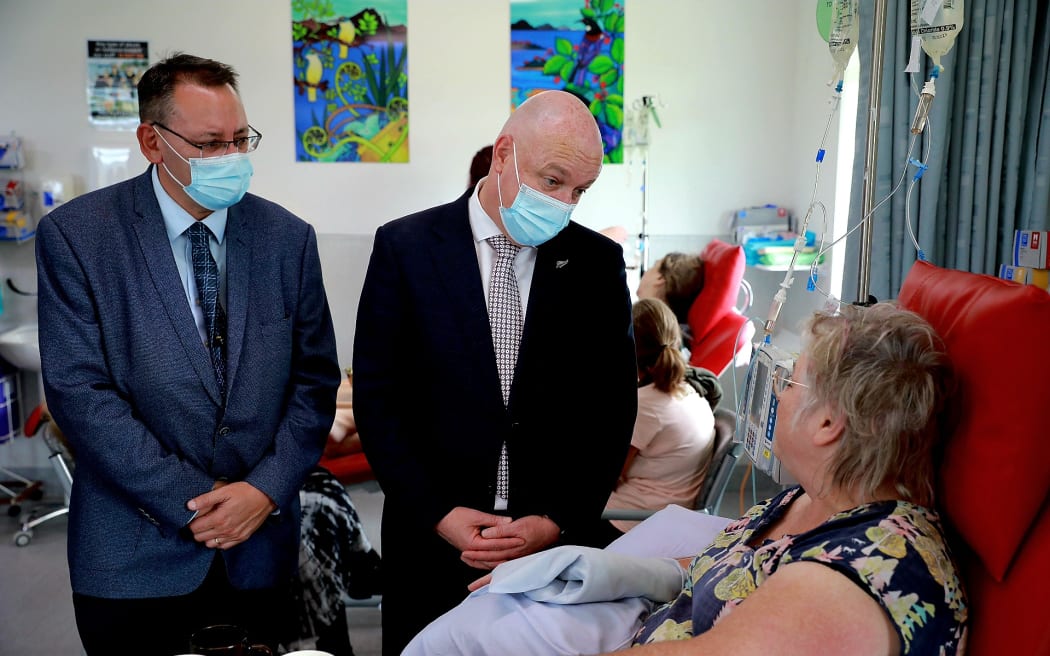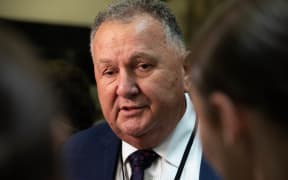Prime Minister Christopher Luxon and Health Minister Shane Reti announced the "five major health targets" to cap off the government's 100-day plan about 1pm.
The pair spoke at Whangārei Hospital after a visit to the radiation oncology facility there.
The targets are:
- Cancer treatment: 90 percent of patients to receive cancer management within 31 days of the decision to treat
- Child immunisation rates: 95 percent of children to be fully immunised at 24 months of age
- ED stay times: 95 percent of patients to be admitted, discharged or transferred from an ED within six hours
- First specialist assessment wait times: 95 percent of patients to wait less than four months
- Treatment wait times: 95 percent of patients to wait less than four months for elective treatment
Health New Zealand Te Whatu Ora would be directed to report quarterly on each target, with the regime coming into effect on 1 July - so the first results will reflect the three months to September.
Dr Reti said child immunisation rates currently were at a disappointing 83 percent, well behind the UK, Australia and Canada - and below New Zealand's 93 percent of 10 years ago - while wait times for first specialist assessments were just 66 percent of people seen within four months.
He said having effective targets and reporting them publicly would help identify problems and take action on them.
"Health workforce will be key to achieving these targets. We know how committed the health workforce is and how hard they are working, which is why building our workforce remains a priority."

Photo: RNZ/Nick Monro
The targets represented a "vigorous new direction in health" after the health system "went backwards under the previous government and its failure to drive targets," he said.
He said the government would set them as annual targets with milestones towards completion, but did not give a firm date he expected to be meeting the targets by.
"If we can plateau out for three, four, five, six months, that's a good outcome actually. So we'll have milestones every year to guide us."
"We'll just do better. We'll find out what enablers are failing us - whether we need to do more with workforce, whether we need to do more with infrastructure or patient flow. There's a number of things that we'll do to keep ourselves on target."
"Some of them like elective and planned care, they were hard for the previous government - you know what? They're going to be hard for us too."
Reti said there were three "key enablers" to help reach the targets.
"So in this calendar year, we'll bring on stream over 100 inpatient beds, and bring on stream eight new operating theatres as part of the infrastructure to help us meet those elective unplanned care objectives, and to be able to move people through the hospital system."
He said one of the things the government needed to work on was ensuring all regions were were handled equally, and he acknowledged Māori and Pasifika also had poor outcomes along the lines of all five targets.
Immunisation was something he wanted to be more widely available through allowing more people to be vaccinators.
"Plunket, for example, we need them to be vaccinators. Everyone from a health perspective who appropriately touches a patient on their journey, who might be able to offer a vaccine, please, let's figure out how to credential them and have them doing that."
The 100-day plan , unveiled in November, broadly specified two of the targets would include "wait times", and "cancer treatment", but Friday's announcement should outline the other three - and detail what specifically is being aimed for.
Luxon confirmed months ago the deadline for the plan was to be 8 March, and has been confident the government had achieved all 49 actions - though questions could be raised about some of these.
"We have completed all 49 actions that we set out to implement over the first 100 days," Luxon said on Friday afternoon.
"It has been incredibly helpful to focus the public service, but also to focus our government to say let's work on the most important things first, and keep making progress."
He said he was "absolutely" happy with the government's use of urgency to push legislation through during its time.
"Because we are under new management in this country. And we are here to grow this country and we want to have more ambition and aspiration. And what was happening before was not working.
"What we have achieved in the first 100 days is something to be incredibly proud about for all of our team. And it's not just our ministers, and our cabinet and our respective MPs that have driven it all. It's also the officials that sit behind it, who have actually responded incredibly well, partnered with us incredibly well as new ministers coming in and there's been some phenomenal outcomes."
"We could say things like banning mobile phones. Initially, the officials can say 'minister, that will take a year, we need to think about that, we need to consult with a bunch of people'. No, no, we don't, we want that ready to go not next year, we want that ready to go the first day of school this year."
Labour attacks 'half-baked' targets
Labour's Health spokesperson Ayesha Verrall said the targets were a half-baked afterthought revealed at the last minute of the government's 100-day plan.
She said they ignored general practice and primary care, which was the part of the health system New Zealanders used most.
"He has also described the primary care system as broken, but he has no target to see it improve ... Doctors' fees remain high, GP enrolments remain untenable, and prescription fees are returning. Those who need healthcare most desperately, and those with complex needs will not get the care they need.
"Emergency department and wait list targets have all been gamed in the past. The previous National government booted people off wait lists to meet their targets, and we need to see a commitment to transparency so this does not happen again."
She said the cancer treatment target did not address long wait times faced for procedures, which would mean bottlenecks that would make the target each to achieve.
"The coalition government's health priorities are all wrong. They've brought back smoking and their targets are ineffective."





